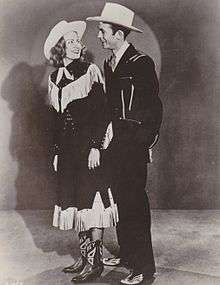Audrey Williams
| Audrey Williams | |
|---|---|
 Audrey and Hank Williams | |
| Background information | |
| Birth name | Audrey Mae Sheppard |
| Born |
February 28, 1923 Banks, Alabama, U.S. |
| Died | November 4, 1975 (aged 52) |
| Genres | |
| Occupation(s) |
|
| Instruments | Vocals |
| Years active | 1937–1975 |
| Labels | MGM |
| Associated acts | |
Audrey Mae Sheppard (February 28, 1923 – November 4, 1975), better known as Audrey Williams, was an American musician and the first wife of country music icon Hank Williams, Sr., mother of Hank Williams, Jr. and grandmother of Hank Williams III and Holly Williams.
Audrey and Hank were married from December 15, 1944, until July 10, 1952, when their divorce was finalized.
Life and career
Sheppard was born in Banks, Alabama, the daughter of Artie Mae (née Harden; 1903–1976) and Charles "Shelton" Sheppard. She grew up on the family farm.[1] Her first husband was James Guy, whom she married as a senior in high school. They had a daughter together named Lycretia (b. 1941) and soon separated, leaving her a young single mother. She met Hank Williams in 1943. In a ceremony performed just 10 days after her divorce became final (and before the expiration of the 60-day waiting period then required after a divorce), she and Hank were married before a justice of the peace at a gas station in Andalusia, Alabama, in December 1944. With Audrey taking up the motivational role that had once been the exclusive preserve of Hank's mother Lillie, the newly-wedded couple visited Nashville intent on meeting songwriter and music publisher Fred Rose, one of the heads of Acuff-Rose Publishing.
Rose liked Hank’s songs and asked him to record two sessions for Sterling Records, which resulted in two singles: “Never Again” in December 1946 and “Honky Tonkin’” in February 1947. Both proved successful and Hank signed a contract with MGM Records early in 1947, with Rose as Hank's manager and record producer.
Meanwhile, Audrey soon began to push for her own spot in the limelight. Since the start of their relationship, Hank had sometimes allowed her to join with his backing band; as well as singing, Audrey played the upright bass. Country biographer Colin Escott wrote "Her duets with Hank were like an extension of their married life in that she fought him for dominance on every note." They recorded several duets together and Audrey featured on the following recordings: "Lost on the River", "I Heard My Mother Praying for Me", "Dear Brother", "Jesus Remembered Me", "The Pale Horse and His Rider", "Jesus Died for Me", "Help Me Understand", Something Got a Hold of Me", "I Want to Live and Love", and "Where the Soul of Man Never Dies".
It has been suggested that Audrey wrote the "Mansion on the Hill" because Hank had writer's block after meeting with Fred Rose.
In early 1948, tensions grew in their relationship as Hank began to abuse alcohol again. Audrey left, having given Hank the choice of alcohol or her. They would eventually reunite, and on May 26, 1949, Audrey gave birth to Randall Hank Williams. Hank nicknamed him "Bocephus", after the name of country ventriloquist Rod Brasfield's dummy. Audrey would make an appearance at the Grand Ole Opry after the birth and officially rename the child Hank Williams, Jr. Meanwhile, Audrey refused to let Hank adopt Lycretia because she was afraid he would take her if they divorced.
On December 31, 1951, after allegations of mutual infidelities and the resumption of Hank's problems with alcohol and pills, Audrey called him from a hotel and told him to be out of their Tennessee house by the time she returned. Hank allegedly replied with the prophetic, "Audrey I won't live another year without you." However, in June 1952, Audrey and Hank divorced for the second time. She was awarded the house and their child, as well as half of his future royalties (on the condition she never remarried). Months after Hank's death, towards the end of 1953, she paid his second wife Billie Jean Jones $30,000 to relinquish the title of and description as "Hank Williams' Widow"; both had been using the description professionally. Billie was in rare agreement with her on this issue.
Like her late ex-husband, Audrey had problems with alcohol and drugs. Hank Jr. became estranged from her after he turned 18. Audrey never remarried. She died on November 4, 1975, from heart failure related to her years of alcohol and drug use at the age of 52, outliving Hank, Sr. by 22 years.
Cultural references
- Audrey is mentioned in the song by Johnny Cash featuring Waylon Jennings: "The Night Hank Williams Came to Town" as "How'd They Get Miss Audrey in That Gown", which is included in Johnny Cash Is Coming to Town album.
- She is also referenced in "Tangled Up Roses" by Shooter Jennings and in Hank Williams Jr.'s song "The Conversation" with Waylon Jennings.
Film depiction
- Susan Oliver played Williams in the 1964 biopic Your Cheatin' Heart opposite George Hamilton as Hank.
- Elizabeth Olsen played Williams in the 2015 biopic I Saw the Light opposite Tom Hiddleston as Hank.[2]
Discography
Singles
| Year | Title | US Country | Label |
|---|---|---|---|
| 1951 | "Leave Us Women Alone" | - | MGM |
| 1952 | "They're Begging You To Stay" | - | |
| 1955 | "Little Bosephus" | - | |
| "I'll Let the Telephone Ring" | - | ||
| 1966 | "Almost Persuaded" | - |
External links
References
- ↑ Family Tradition accessed 7-22-2015
- ↑ Jonathan Bernstein (12 September 2014). "Elizabeth Olsen to Play Hank Williams' Wife in Upcoming Movie". Rolling Stone. Retrieved 15 September 2014.